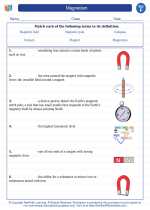Organisms
An organism is a living thing that can carry out essential life processes such as growth, reproduction, response to stimuli, and maintenance of homeostasis. Organisms can be classified into different kingdoms based on their characteristics and evolutionary relationships.
Types of Organisms
- Plants: Organisms that typically have cell walls, perform photosynthesis, and are stationary.
- Animals: Organisms that are typically mobile, capable of complex movements, and often have specialized sense organs.
- Fungi: Organisms that can be single-celled or multicellular, and obtain nutrients by decomposing organic matter.
- Protists: A diverse group of organisms that may be animal-like, plant-like, or fungus-like.
- Bacteria: Single-celled microorganisms that lack a nucleus and are found in various environments.
- Archaea: Single-celled microorganisms that can live in extreme environments and have unique genetic and biochemical characteristics.
Characteristics of Organisms
Organisms share several common characteristics:
- Cellular Organization: All organisms are composed of one or more cells.
- Metabolism: Organisms carry out chemical reactions to obtain and use energy.
- Response to Stimuli: Organisms can respond to changes in their environment.
- Growth and Development: Organisms can grow and undergo changes over time.
- Reproduction: Organisms can produce offspring either sexually or asexually.
- Homeostasis: Organisms can maintain stable internal conditions despite external changes.
- Heredity: Organisms pass on genetic information to their offspring.
Study Guide
When studying organisms, it's important to understand the following concepts:
- What are the characteristics of living organisms?
- How do organisms obtain and use energy?
- What are the different kingdoms of organisms, and what are their defining traits?
- How do organisms respond to stimuli in their environment?
- What are the processes of growth, development, and reproduction in organisms?
- How do organisms maintain homeostasis?
- What are the roles of genetics and heredity in organisms?
By understanding these key concepts, you can gain a comprehensive understanding of organisms and their importance in the natural world.
.◂Science Worksheets and Study Guides Sixth Grade. Magnetism
Study Guide Magnetism
Magnetism  Activity Lesson
Activity Lesson Magnetism
Magnetism  Worksheet/Answer key
Worksheet/Answer key Magnetism
Magnetism  Worksheet/Answer key
Worksheet/Answer key Magnetism
Magnetism  Worksheet/Answer key
Worksheet/Answer key Magnetism
Magnetism  Worksheet/Answer key
Worksheet/Answer key Magnetism
Magnetism  Vocabulary/Answer key
Vocabulary/Answer key Magnetism
Magnetism 

 Activity Lesson
Activity Lesson
 Worksheet/Answer key
Worksheet/Answer key
 Worksheet/Answer key
Worksheet/Answer key
 Worksheet/Answer key
Worksheet/Answer key
 Worksheet/Answer key
Worksheet/Answer key
 Vocabulary/Answer key
Vocabulary/Answer key

The resources above cover the following skills:
EARTH AND SPACE SCIENCE
Earth’s Systems
Develop and use models of Earth’s interior composition to illustrate the resulting magnetic field (e.g., magnetic poles) and to explain its measureable effects (e.g., protection from cosmic radiation).